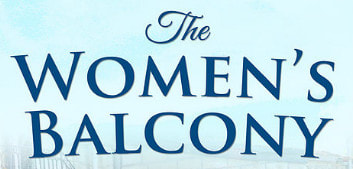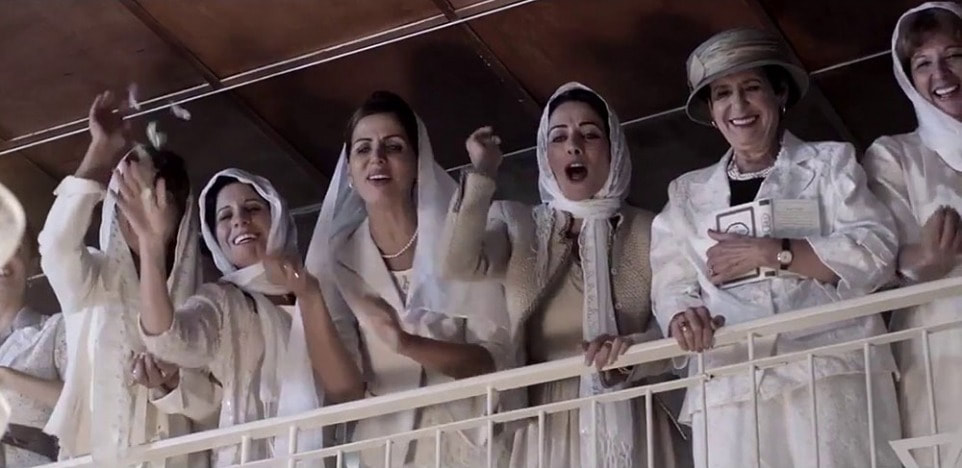
Reviewed by Jordan Hoffman / Village Voice
What will become of Zion? No, not the loosely defined term for a Jewish homeland in the Middle East, but a mild-mannered and fundamentally righteous shopkeeper living in Jerusalem and pulled between conservative religious forces and modernity. (Oh, so maybe I do mean the Jewish homeland in the Middle East.)
Zion (Igal Naor) is a key member of the small, proud, friendly synagogue at the center of The Women’s Balcony. It’s the type of place where you can tie your neighbor’s prayer shawl to his chair so it falls off when he rises. Then, one day, the roof caves in. Actually, it’s the flooring from the second level, the section where women observe so the men below can pray without distraction. While this sort of bonk-you-on-the-head symbolism isn’t exactly subtle, the amusing performances and spry pacing nudge this into fable territory. This may be a modern tale, but the story is from before the flood.
With the wise old rabbi in shock, the congregation ends up in the clutches of the young, charismatic — and far more conservative — Rabbi David (Aviv Alush). His frum costuming already provides him with the black hat. (Our guys, including Zion and his three buddies, wear the clothes of workingmen.)
Rabbi David promises to help rebuild the temple, but first he suggests that the wives dress more modestly. His are not angry, fire-and-brimstone sermons, but instead almost lighthearted chats “explaining” why it honors women to keep them tucked out of sight. Step 1, each man presenting his wife with headscarves, is laughed off as a joke. Step 2, when the rebuilt temple does not include a women’s section at all, finds the women, led by Zion’s wife, Esther (Evelin Hagoel), choosing to protest.
The Women’s Balcony is one of Israel’s biggest domestic hits of all time, and it comes as the country is undergoing serious internal conflict over its treatment of women in religious life. (Google “Women of the Wall,” then explain to me how a nation that continuously delivers cutting-edge medical and technological advances can also be so backward.) Though this is clearly a serious topic, the film is wisely a comedy first and a political story second.
It does, however, revel in its specificity. A joke like “I’ll wear it on Purim” or an argument about Shabbos goys will land better with audiences familiar with Jewish customs. This is frequently a problem with some regional filmmaking, in which mere representation rather than good storytelling is often considered sufficient because it delights the intended audience. (Many such movies from around the globe fail this way, but let’s call My Big Fat Greek Wedding the nadir of this phenomenon.)
Many of the Israeli pictures that make art-house waves here don’t have this problem, but then again most of those movies aren’t fun. This light and predictable movie, with its overwhelming box office success, still offers tremendous insight into day-to-day Israeli society. The view from the balcony is worth the climb.
What will become of Zion? No, not the loosely defined term for a Jewish homeland in the Middle East, but a mild-mannered and fundamentally righteous shopkeeper living in Jerusalem and pulled between conservative religious forces and modernity. (Oh, so maybe I do mean the Jewish homeland in the Middle East.)
Zion (Igal Naor) is a key member of the small, proud, friendly synagogue at the center of The Women’s Balcony. It’s the type of place where you can tie your neighbor’s prayer shawl to his chair so it falls off when he rises. Then, one day, the roof caves in. Actually, it’s the flooring from the second level, the section where women observe so the men below can pray without distraction. While this sort of bonk-you-on-the-head symbolism isn’t exactly subtle, the amusing performances and spry pacing nudge this into fable territory. This may be a modern tale, but the story is from before the flood.
With the wise old rabbi in shock, the congregation ends up in the clutches of the young, charismatic — and far more conservative — Rabbi David (Aviv Alush). His frum costuming already provides him with the black hat. (Our guys, including Zion and his three buddies, wear the clothes of workingmen.)
Rabbi David promises to help rebuild the temple, but first he suggests that the wives dress more modestly. His are not angry, fire-and-brimstone sermons, but instead almost lighthearted chats “explaining” why it honors women to keep them tucked out of sight. Step 1, each man presenting his wife with headscarves, is laughed off as a joke. Step 2, when the rebuilt temple does not include a women’s section at all, finds the women, led by Zion’s wife, Esther (Evelin Hagoel), choosing to protest.
The Women’s Balcony is one of Israel’s biggest domestic hits of all time, and it comes as the country is undergoing serious internal conflict over its treatment of women in religious life. (Google “Women of the Wall,” then explain to me how a nation that continuously delivers cutting-edge medical and technological advances can also be so backward.) Though this is clearly a serious topic, the film is wisely a comedy first and a political story second.
It does, however, revel in its specificity. A joke like “I’ll wear it on Purim” or an argument about Shabbos goys will land better with audiences familiar with Jewish customs. This is frequently a problem with some regional filmmaking, in which mere representation rather than good storytelling is often considered sufficient because it delights the intended audience. (Many such movies from around the globe fail this way, but let’s call My Big Fat Greek Wedding the nadir of this phenomenon.)
Many of the Israeli pictures that make art-house waves here don’t have this problem, but then again most of those movies aren’t fun. This light and predictable movie, with its overwhelming box office success, still offers tremendous insight into day-to-day Israeli society. The view from the balcony is worth the climb.
DISCUSSION FOLLOWS EVERY FILM!
$6.00 Members / $10.00 Non-Members
TIVOLI THEATRE
5021 Highland Avenue I Downers Grove, IL
630-968-0219 I www.classiccinemas.com
$6.00 Members / $10.00 Non-Members
TIVOLI THEATRE
5021 Highland Avenue I Downers Grove, IL
630-968-0219 I www.classiccinemas.com







